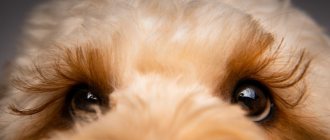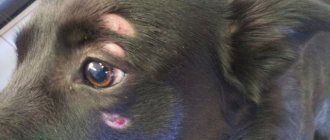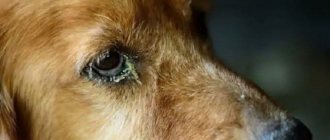Excessive tearing in a dog is often interpreted as a protective function to cleanse the eye and remove foreign matter or microorganisms. However, few people know that cloudy discharge from a dog’s eyes is a serious symptom that cannot be ignored. The causes of sputum can be either an infected mechanical damage to the membrane of the eye, or an initial sign of infection with a disease dangerous to health.
Of course, it is possible to eliminate isolated cases of discharge from a dog’s eyes at home. But what if they are mixed with blood, pus or another color?
Discharge from a dog's eyes - causes and methods of treatment
In veterinary practice, secretions from a dog’s eyes are classified according to two characteristics: purulent and lacrimal.
Typically, the presence of profuse and clear lacrimation is not associated with a specific pathology within the body. This may be the consequences of mechanical damage, structural features of the skull or an allergic reaction.
The appearance of mucus in the corners of the eyes in the morning is normal for puppies of all breeds.
Brown discharge
For example, brown discharge from a dog's eyes after sleep indicates dysfunction of the tear ducts. This is due to the peculiarity of the formation of the skull of certain breeds. This pathology is often observed in dogs with bulging eyes, flat muzzles, sagging cheeks and light hair. Since brown discharge from a dog’s eyes is still a deviation from the norm, the pet should be shown to a doctor to rule out an infectious pathology.
If this feature of the animal’s body is harmless, wipe its eyes every morning with a damp and clean cloth, without using chemicals. If brown tearing occurs frequently in puppies, ask your veterinarian to prescribe the appropriate drops.
Wet tracks and dried crusts near your pet's eyes may be a sign of natural vision problems.
White discharge from eyes
Secretion of a white shade means the development of pathological processes in the body. For example, entry of a foreign body and infection of the eyes or internal diseases of the organs of vision. If at the same time the animal often scratches its eyes, rubs its head on objects, is poorly oriented in space, and the eyelids are swollen and the whites are red, you cannot self-medicate and schedule a visit to the doctor. If medical care is not provided promptly, the dog may lose its vision.












